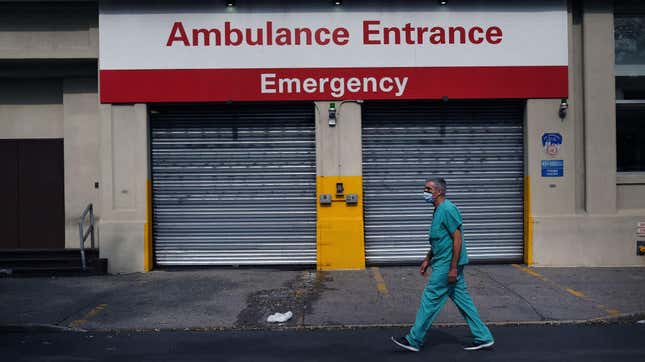
A lab-made antibody treatment has shown encouraging results in preventing hospitalizations from covid-19, at least in some preliminary data. On Tuesday, the pharmaceutical company Eli Lilly announced that its experimental antibody treatment was found to reduce the rate of hospitalizations among people with covid-19 treated in an outpatient setting, compared to a placebo control group. But the findings aren’t a clear home run yet.
Eli Lilly’s treatment, called LY-CoV555, is a monoclonal antibody. Monoclonal antibodies are antibodies created from a single cell, cloned in the lab. Though they are based on naturally produced antibodies from the immune system, they’re often tweaked to be more effective or safer at whatever task they’re meant to accomplish. Monoclonal antibodies are used in medicine to treat conditions like cancer, autoimmune disorders, and viral infections, and scientists have been very hopeful about using them to treat the infection that causes covid-19.
LY-CoV555 is derived from one kind of neutralizing antibody—an antibody that prevents the coronavirus SARS-CoV-2 from infecting cells—found in covid-19 survivors. It was initially discovered by scientists at the biotech firm AbCellera, which has since created a partnership with Eli Lilly to develop it. There is already a Phase III trial for LY-CoV555 underway, being run in conjunction with the National Institutes of Health.
These latest results come from an “interim analysis” of data from a Phase II trial of LY-CoV555. The ongoing trial, named BLAZE-1, is meant to test the treatment’s safety and optimal dose more than its effectiveness. It’s supposed to recruit 800 participants by the end, all diagnosed with mild-to-moderate covid-19 but not necessarily sick enough to need hospitalization or emergency care. Volunteers have been randomized to one of four groups: one receiving a placebo, and the other three receiving varying doses of LY-CoV555.
Those given LY-CoV555 (across all dose groups) were less likely to need hospitalization or visit the emergency room than those who got the placebo, the company said Tuesday. Just 1.7% of LY-CoV555 patients needed hospital care, compared to 6% on placebo, amounting to a 72% relative reduction of risk. Additionally, the treatment seemed to be well tolerated, with no serious drug-related adverse event said to be reported, and there appeared to be little evidence of the virus having strong innate resistance to the antibody in patients.
“These interim data from the BLAZE-1 trial suggest that LY-CoV555, an antibody specifically directed against SARS-CoV-2, has a direct antiviral effect and may reduce COVID-related hospitalizations,” Daniel Skovronsky, Eli Lilly’s chief scientific officer and president of Lilly Research Laboratories, said in a statement released by the company. “The results reinforce our conviction that neutralizing antibodies can help in the fight against COVID-19.”
Though the company has said that it plans to present these findings in a peer-reviewed journal, that hasn’t happened yet, so any results should be viewed with healthy caution for now. And while the results do seem promising overall, there are some quirks that could throw them into question.
For instance, it was only in the group that received the medium dose of LY-CoV555 (2,800 milligrams), that the primary goal of the trial was met, where the treatment group had significantly smaller levels of the virus in their system than the placebo group; no similar result was seen in either the low- or high-dose group. That isn’t necessarily damning, but many drugs tend to have a dose-response curve, where their effects on the body are more potent the higher the dose.
It’s possible that this trial simply wasn’t great at measuring the true strength of the treatment—stopping the virus from growing sooner than if nothing was done. Indeed, the company is arguing that its early analysis shows people given LY-CoV555 had less of the virus in their system by day three than the placebo group. Most people in the trial, placebo or not, had cleared the infection by day 11; it’s possible that additional benefit from the treatment would have been detectable in patients who were sick for longer.
It’s also possible the positive results, including the lower hospitalization rate, are a statistical fluke. Even if that is the case, it doesn’t rule out that monoclonal antibodies could be a useful treatment, especially for more severe cases. It just means that any early results, no matter how good, have to be carefully studied by others and replicated before we can be sure about them.